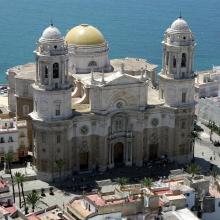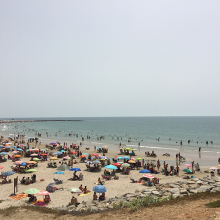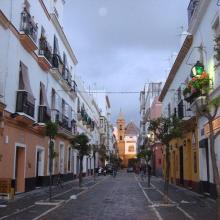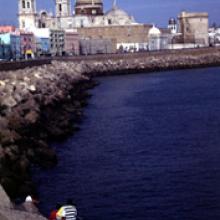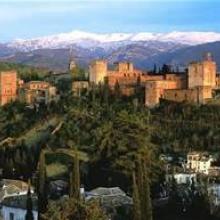The NW CÁDIZ program offers American students the opportunity to live and study in Cádiz, Spain for fall quarter. Administered by the University of Washington, this study-abroad program operates under a formal working agreement with the University of Cádiz. Students live with a private family (rarely in a residence hall), and attend classes at the University of Cádiz Facultad de Filosofía y Letras. NW CÁDIZ courses are especially designed for the program's students and are taught in Spanish by members of the University of Cádiz faculty. Linguistically capable students may also enroll in one or more regular University of Cádiz classes.
The New York Times also has chosen Cádiz as one of its "52 Places to Go in 2019" (external link).
ABOUT CÁDIZ
Cádiz is located on Spain's southern Atlantic coast, midway between Portugal and the Strait of Gibraltar. The city's current population is approximately 150,000. Founded by Phoenician traders around 1100 B.C., Cádiz is the oldest city in Spain and possibly the oldest in Europe. Because of its antiquity and its strategic geographic situation, Cádiz's role in the formation of the Spanish nation has been unsurpassed by that of any other Spanish city. The original Phoenician outpost of Gadir would later be colonized by the Carthaginians, Romans, Visigoths, and Moors. In 1262, during the Christian reconquest of the Iberian Peninsula, Cádiz was conquered by King Alfonso X. In the late 15th and early 16th centuries the city and its port played a central role in Spain's voyages of exploration and conquest, including Columbus' second, third, and fourth voyages to America. During the next two centuries Cádiz continued to bear the brunt of ongoing naval hostilities between Spain and England, but it also prospered as Spain's principal port for commerce with the New World and with Europe. This intense international commerce brought with it philosophical, artistic, and political currents from other nations, endowing Cádiz and its people with the tolerance and hospitality that still characterize them today. In the 19th century, with the independence of Spain's American colonies, the city's importance as a shipping center declined, but it continued to play a key role in the nation's political life as Spain's principal window to Europe and as an oasis of liberal thought throughout that turbulent century. The Gaditanos are intensely proud of the fact that Spain's first modern constitution was written and promulgated in Cádiz in 1812. Many special events were held throughout 2012 to celebrate the bicentennial of the Spanish Constitution.
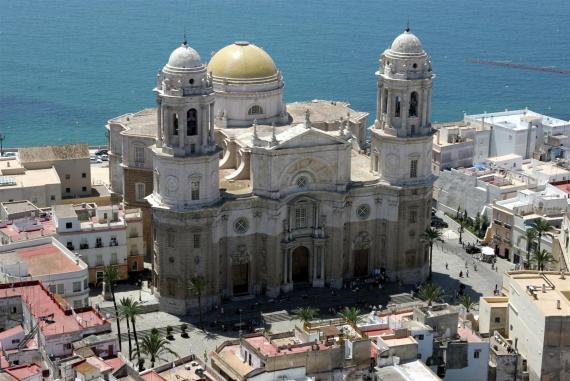
Today's Cádiz is linked to Madrid and Barcelona by commercial air service, and to all of Spain by frequent high-speed trains. There is ferry service from Cádiz to the Canary Islands and North Africa. The economy of the city and the surrounding region is based on fishing, maritime industries, and the production of Sherry wines. Because of its mild climate and brilliant sunshine, the area's spectacular coastline is known as the Costa de la Luz. The narrow peninsula on which Cádiz is situated is divided by a seventeenth-century fortified rampart, the Puerta de Tierra, behind which is located the Casco Antiguo, or old Cádiz. The layout and outward appearance of the old city have remained largely unchanged for the past two centuries. This part of the city is characterized by buildings of three and four stories, clustered on narrow, teeming streets that open onto gracious plazas or the surrounding sea. On the inland side of the rampart is the new Cádiz with its high-rise apartment houses that pose a striking architectural contrast to the quaint Casco Antiguo. The coastal periphery of the city is lined with promenades, old fortifications, an industrial port, and public beaches, including the longest urban beach in Europe.
The traditions of Cádiz offer many opportunities for recreation and cultural enrichment outside the classroom. Geography and history have endowed Cádiz with close ties to Latin America. One product of this link is the Festival de Teatro Hispanoamericano, which takes place in the theatres and plazas of Cádiz each year in October. In February, as a prelude to the Lenten season, Cádiz becomes the site of the Iberian Peninsula's most colorful and spirited Carnival. University classes are cancelled for a week as the city is transformed into a boisterous fantasyland of costumes and revelry. During the week before Easter, Cádiz, like the rest of Spain, celebrates Semana Santa with a timeless blend of solemn rituals and festive pageantry. Again, the university closes for a week so that students and faculty may fully enjoy this most traditional of Spanish holidays.

The Bay and Gulf of Cádiz are ringed with places of interest. Chiclana, San Fernando, Sanlúcar de Barrameda, El Puerto de Santa María, and Jerez de la Frontera are important centers of the subcultures associated with Flamenco music, Sherry wines, and the breeding of Andalusian horses and fighting bulls. The University of Cádiz sponsors frequent student excursions to these and other places of interest. North of Cádiz lies Spain's largest national park, Doñana. Once a hunting reserve for the royal family, Doñana is now a sanctuary for migratory birds and other wildlife. The mountains in the province of Cádiz are famous for their quaint pueblos blancos and are ideal for hiking, biking, and camping.
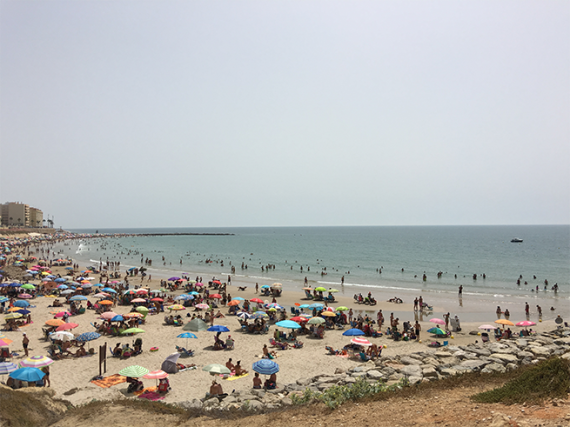
THE UNIVERSITY OF CADIZ
The University of Cádiz, in existence since 1980, is one of the younger members of Spain's national university system. The NW Cadiz program operates in the university's Facultad de Filosofía y Letras, located on the old city's shoreline drive, across from an expansive park that opens onto the sea. The Facultad is housed in a recently restored eighteenth-century building whose interior is spacious and bathed in light, thanks to a design that features abundant use of full-length windows and interior patios adorned with the lush vegetation of the region. Classrooms are equipped with modern audiovisual installations. Computer labs are available for student use and open WIFI connection is available in and near the Facultad and here and there throughout the city. The Casco Antiguo, with its endless recreational possibilities, lies just to the inland side of the Facultad. The University of Cádiz has a home page on the Web: http://www.uca.es.
CLASSES OFFERED:
Credits: 20-25 per semester (+optional 2 credits SPAN 392 [majors] or 2-4 credit 393 CR/NC)
UPDATED – STUDY ABROAD POLICY
While students may earn more credits on a study abroad program, they can use (or count) a maximum of 15 credits towards the major in Spanish, a maximum of 12 credits towards the minor in Spanish, and 10 credits in Spanish for General Studies credit, through study abroad program. |
NW CÁDIZ students will enroll in courses designed especially for the program and taught in Spanish by University of Cádiz faculty. Most classes meet three hours per week and carry three semester credits. A typical course load is four or five courses per semester, depending on the requirements of the student's home institution. For students whose American university operates on the quarter system, credits will be converted to quarter credits by the home institution (one semester credit normally equals 1.5 quarter credits). All courses are graded on a 4 point scale. We will convert and assign A, A-, B+ grades for students from other universities at their request. Credit/No Credit is not normally an option. The curriculum consists of advanced Spanish grammar and composition (required of all students except those exempted by their home university), plus a variety of other courses in the humanities, social sciences, and fine arts as they pertain to the Spanish-speaking world. Academic calendars permitting, qualified students may be allowed to enroll in regular university courses. Students with an interest in oceanography and marine ecology may wish to participate in activities offered by the university's Facultad de Ciencias del Mar.
During the 2022-2023 academic year the program plans to offer the following courses:
FALL
- Spanish 301/314, 302/315 & 303/316 [Language sequence]
- Spanish 321 [Introduction to Hispanic Literatures]
- Spanish 322 [Introduction to Hispanic Culture]
- Spanish 323 [Introduction to Hispanic Linguistics]
- Spanish 404 [Spanish Dialectal Variations]
- Spanish 406 [Advanced Spanish Language course for those who have completed Spanish 303]
- SPAN 494 + SPAN 496 [400-level content courses]
Qualified students may also choose to take at least one regular Univ. of Cádiz course. In addition, students will have the opportunity to undertake independent study projects and honors coursework under the supervision of our UCA faculty and the program's Resident Director. Credit for these projects will vary in accord with the scope and difficulty of each project. Occasionally, qualified students may choose to undertake practice teaching (of English) at the K-7 or university level.
In addition to regular classes, students will have the opportunity to participate in a number of excursions through southern Spain, depending on personal interest:
- Ronda, Spain (1 day, September)
- Córdoba and Granada (3 days, October)
CALENDAR OF EVENTS planned for Autumn 2022
FALL 2022 (TENTATIVE)
| Aug. 26 (Fri.) | Flights to Spain. Arrival in Cádiz Aug. 27 (Sat.). |
| Aug. 29-Sept. 2 | Orientation Program in Cádiz. |
| Sept. 5 (Mon.) | Classes begin at Univ. of Cádiz. |
| Oct, 12, Nov.1, Dec. 6, 8 | Traditional holidays (dates may shift by 1 day) |
| Dec. 13 (Tue.) | Last day of classes (exams 14-16) |
| Dec. 17 (Sat.) | A group bus to the Jerez airport will be available to all (leaving Dec. 17, early AM from Cadiz). Students will make the remainder of their travel plans on their own. No departures before Dec. 17. Details in the Program Activities Calendar. |
PROGRAM ADMINISTRATION
NW CÁDIZ is operated by the University of Washington. Western Washington University is an affiliated institution. In Cádiz the program is directed by a full-time Resident Director, a 2002 UW graduate who majored in Spanish and International Studies. The Resident Director is assisted by a UW graduate assistant, a local University of Cádiz faculty coordinator who is also one of the program's instructors and by a Housing Coordinator. The Northwest Cadiz Program invites applications from students who are currently enrolled at any college or university in the U.S. or Canada.
ELIGIBILITY AND ENROLLMENT
The program will accept applications from students who are currently enrolled in any accredited college or university in the U.S. All students apply to the program through the UW Study Abroad Office's NW Cádiz Program website: UW Study Abroad WEBAPP. In order to be officially enrolled at UW and to receive grades and an official transcript, all students must pay the non-refundable UW Study Abroad fee of $700 by deadline posted in the UW Study Abroad Cádiz program description. This single (one-time) fee covers one or two semesters of study in Cadiz. Students from schools other than the University of Washington must also enroll as non-matriculated students at the University of Washington and pay a $200 non-matriculated UW student fee.
Minimum requirements for enrollment are the completion of SPAN 203 prior to departure for Spain, an overall GPA of 2.5, and a GPA in Spanish of 3.0. Even though NW CÁDIZ is primarily a program for undergraduates, special arrangements can sometimes be made for graduate students to receive credit for work done in the program.
APPLICATION DEADLINES/GUIDELINES
Applications for the fall semester (including letters of recommendation) are due on March 1. February 15 is the deadline for those students applying for a UW Study Abroad Scholarship.
PROGRAM COST
Fall Semester: (Aug. 26 - Dec. 17) $8700 + $450 (UW Study Abroad concurrent enrollment fee)
The program fee covers full room and board in Cádiz, tuition at the University of Cádiz, textbooks & coursepacks, scheduled program activities and excursions, and transfer to and from the Jerez airport on the scheduled arrival and departure days each semester. Expenses not included in the program fee are travel to and from Spain, personal spending money and passport/visa expenses.
University of Washington students who normally receive financial aid may use most forms of financial aid to study on the NW CÁDIZ program. Students from other institutions should check with their financial aid office to determine applicability of their financial aid to this program. All students who are receiving financial aid should determine the number of courses they must carry in order to remain eligible for financial aid.
STUDENT VISA
All students with a non-European passport need to apply for a Student Visa at the Consulate of Spain in San Francisco. The faculty program director will help students to compile all materials for the visa application but it is the student's responsibility to submit the application in person in San Francisco.
PAYMENT SCHEDULE AND REFUND POLICY
For information regarding Autumn 2022 payment schedule and refund policy may be found on the study abroad program website.
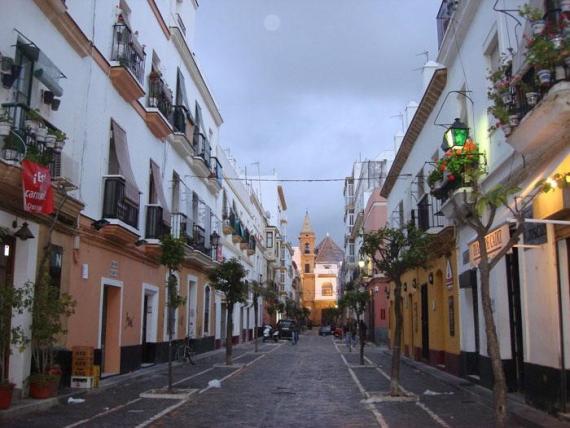
TRAVEL ARRANGEMENTS
The cost of travel to and from Spain is not included in the program fee. However, the program will assist students in making travel arrangements that will enable them to travel to and from Spain in accord with the official arrival and departure dates for their semester(s) of study. Students are free to make their own travel arrangements, so long as they arrive by the official start date and depart after the last scheduled final exam.
HOUSING ARRANGEMENTS IN CÁDIZ
Students will normally live in private homes, but it may sometimes be possible to arrange housing in a residence hall for those who strongly prefer not to live with a local family. We do not presently allow shared apartment living as a housing option for undergraduates. For the occasional student who is accompanied throughout the semester by a partner or child, other living arrangements are possible, but it will be the responsibility of the student to make such arrangements.
MEDICAL INSURANCE
Before leaving the country, all students studying abroad through a UW program must take out an insurance policy with the Study Abroad office for the duration of their study abroad program. We recommend it cover you for the entire extent of your travels abroad. If you are covered under another policy, you may apply to the UW Study Abroad office for a waiver of this requirement, but other policies are unlikely to have comparable coverage (particularly medical evacuation and emergency repatriation coverage). Cost may increase modestly from year to year, but this policy will be approximately $49/mo. If you need more information about the insurance, please contact Darielle Horsey (djh83@uw.edu).
RESPONSIBILITY
NW CÁDIZ will exercise all reasonable care in the operation of its program. However, notice is hereby given that all arrangements for transportation and other services are made for the program's participants upon the condition that NW CÁDIZ, its officers, and its sponsoring institutions assume no responsibility or liability for any injury, damage, loss, accident, delay, or other irregularity occasioned by reason of or defect in any means of transportation or acts of defaults of any company, agency, or person providing transportation or other services. Information contained in this brochure was accurate at the time the brochure was printed. NW CÁDIZ is not responsible for changes that occur after the printing of this brochure. However, the internet version of the brochure will be updated regularly and the program will do everything possible to assure that its participants are in possession of up-to-date information on the program and the conditions of its operation prior to enrollment in the program and departure for Spain. NW CÁDIZ reserves the right to cancel the program at any time and for any reason.
FURTHER INFORMATION
Further information about the NW CÁDIZ program may be obtained by writing Antonio Rueda arueda@uw.edu or Rita Serghini serghini@uw.edu.
APPLICATIONS
UW Study Abroad Office NW Cádiz Program Application
SCHOLARSHIPS
See this document provided by the Study Abroad office for information about applying and elegibility for scholarships (external link.)
- Go Global Scholarship- $2,000-5,000. Eligibility: WA resident with documented financial need.
- Fritz Scholarship- $2,000-5,000. Eligibility: Humanities or Social Sciences major with a cumulative GPA of at least 3.0.
- Susan B. Johnson Scholarship for Study in Spain- $500-$1000. Eligibility: yearlong enrollment in a study program in Spain; based on need and merit. Contact Ana M. Gómez-Bravo for more information.
- Benjamin A. Gilman International Scholarship Program- up to $5000. Eligibility: current Pell Grant recipient. Diversity oriented: under-represented students, fields of study, etc. For more information and application deadlines go here.
- WAFLT Student Excel Scholarships- $500. Eligibility: WA resident enrolled in a 300-level or higher world language course in Fall Quarter. Merit based. Application deadline early March for following year.
- Funding Ideas for Study Abroad
